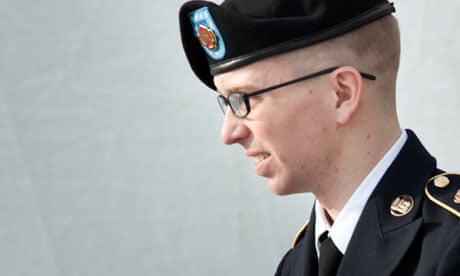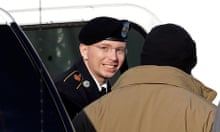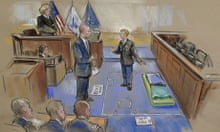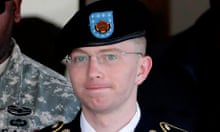Bradley Manning, the soldier accused of being behind the largest leak of state secrets in US history, is expected this week to speak publicly for the first time since his arrest in May 2010.
The alleged source of the massive WikiLeaks dump of hundreds of thousands of US diplomatic cables and war logs is expected to be called as a witness at the latest pre-trial hearing opening in Fort Meade army base in Maryland on Tuesday afternoon. His direct address to the court will be a poignant event that will be followed closely by both his supporters, who see him as a heroic whistleblower, and his detractors, who regard him as a traitor.
Jeff Paterson of the Bradley Manning support network said it would be a very telling moment. "Until now we've only heard from Bradley through his family and lawyers, so it's going to be a real insight into his personality to hear him speak for himself for the first time."
The hearing, slated to last until Sunday, also marks a crucial stage in the legal proceedings in the run-up to a full court martial scheduled for 4 February.
Manning's lawyer, David Coombs, is seeking to have any eventual sentence imposed on the soldier radically reduced or even entirely negated on the grounds that he was subjected to pre-trial punishment while he was confined at Quantico marine base in Virginia.
Manning's harsh treatment during the nine months he was held in the brig at Quantico, from 29 July 2010 to 20 April 2011, have become something of a cause célèbre, with several influential people and organisations castigating the military authorities for subjecting him to a form of torture.
The treatment led to a wave of international indignation, from figures as diverse as the UN rapporteur on torture, Amnesty International, leading law scholars and PJ Crowley, then spokesman at the US state department, who resigned in protest.
Manning's lawyers are expected to make the case to the military judge presiding of the pre-trial proceedings, Colonel Denise Lind, that commanders at the brig in Quantico ignored expert medical advice in subjecting the soldier to prolonged solitary confinement. Coombs has requested to call eight witnesses in total, though it is not clear how many of those have been cleared by Lind.
According to the Manning support network, the first witnesses are likely to be the Quantico commanders in charge of the brig during the nine months in which Manning was held there. Legal documents released by Coombs earlier this year alleged that one of the commanders told his staff that "we will do whatever we want to do" with the captive soldier. There may also be an attempt to show that the orders relating to Manning came from higher up the military hierarchy, from a three-star general, suggesting they may have had a political motivation.
Next up are likely to be at least two military psychiatrists who will be asked to testify that they recommended on numerous occasions that Manning be taken off the so-called "prevention of injury" order, or PoI, that kept him in effective solitary confinement.
Official records have shown that the psychiatrists made at least 16 official reports to military commanders that Manning was not a threat to himself or others and therefore should not have been subjected to extraordinary treatment. He was held in his cell for 23 hours a day, withheld possessions, checked every five minutes and stripped naked at night in humiliating fashion.
Manning himself is likely to be the last of the defence witnesses called, after which the army prosecutors will have the floor.







Comments (…)
Sign in or create your Guardian account to join the discussion